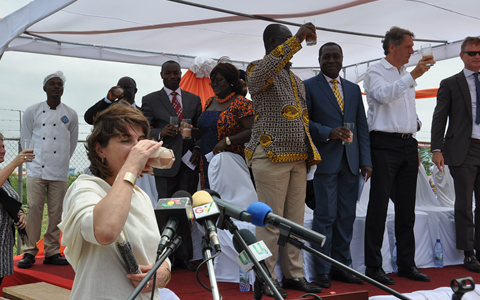 The Dutch Minister for Foreign Trade and Development Cooperation, Ms. Lilianne Ploumen, has officially launched the Cocoa Rehabilitation and Intensification Programme CORIP at the Cargill factory premises in Tema.
The Dutch Minister for Foreign Trade and Development Cooperation, Ms. Lilianne Ploumen, has officially launched the Cocoa Rehabilitation and Intensification Programme CORIP at the Cargill factory premises in Tema.
Funded both by the Netherlands Embassy in Ghana through a 7 million Euro grant and by the private sector through an expected co-funding of up to 14 million Euros, CORIP aims to develop the economic, social and environmental sustainability of cocoa farming in Ghana.
It addresses the institutional challenges of the cocoa supply chain in finding efficient ways of providing support services to cocoa growers.
Launching the programme, Ms. Lilianne Ploumen said CORIP is a great example of public-private sector cooperation, where public funds are used to leverage private funding
“Through the programme, the Netherlands aims to help bring together the main actors in the cocoa sector to find innovative solutions. Chocolate producers, traders NGOs, government, researchers and farmers will work together under the CORIP to find ways to create a more sustainable cocoa sector,” said Minister Lilianne Ploumen.
At a media briefing prior to the official launch, the Managing Director of Solidaridad, Mr. Isaac Gyamfi explained that the programme would develop entrepreneurial cocoa farmers pursuing cocoa farming as a business.
The main strategy for implementing CORIP is through the establishment and operation of cocoa Rural Service Centres (RSC) across the cocoa belt of Ghana.
“The RSC would be a privately operated and commercially run centre providing and facilitating access of farmers to good agronomic practices training, information, technology use, fertilizers, credit and other inputs as well as technical support necessary for the intensification of cocoa production systems.
It is expected that after four years, the successfully validated innovations coming out of the RSC will be scaled up with the direct support of the national cocoa sector regulator, private cocoa companies, farmer associations and groups”, Mr. Gyamfi added.
A total of 20 RSCs will be established under CORIP over the next four years. Each RSC is expected to cater for 2,000 farmers, thus 40,000 direct beneficiaries are expected to be impacted upon by the programme.
It is also anticipated that the RCSs will help improve cocoa yields in Ghana from an average of 400-450kg to 1000kg per hectare
Six initial private sector cocoa companies made up of Cargill, Olam, Mondelez, Armajaro, Touton and ADM are participating in CORIP.
These companies are co-funding the establishment and implementation of the cocoa RSCs. Other collaborating partners include the International Fertilizer Development Center (IFDC), Ghana Cocobod/Cocoa Research Institute of Ghana (CRIG) and The Dutch Sustainable Trade Initiative (IDH).
The entire programme is managed by Solidaridad West Africa.
Cocoa is an important commodity to both Ghana and the Netherlands. To Ghana it is the single most important agricultural commodity for a country that is the second largest producer of cocoa in the world with total bean sales averaging USD2 billion per annum.
Most of Ghana’s cocoa and cocoa products are exported to the Netherlands.
Source: Myjoyonline.com























